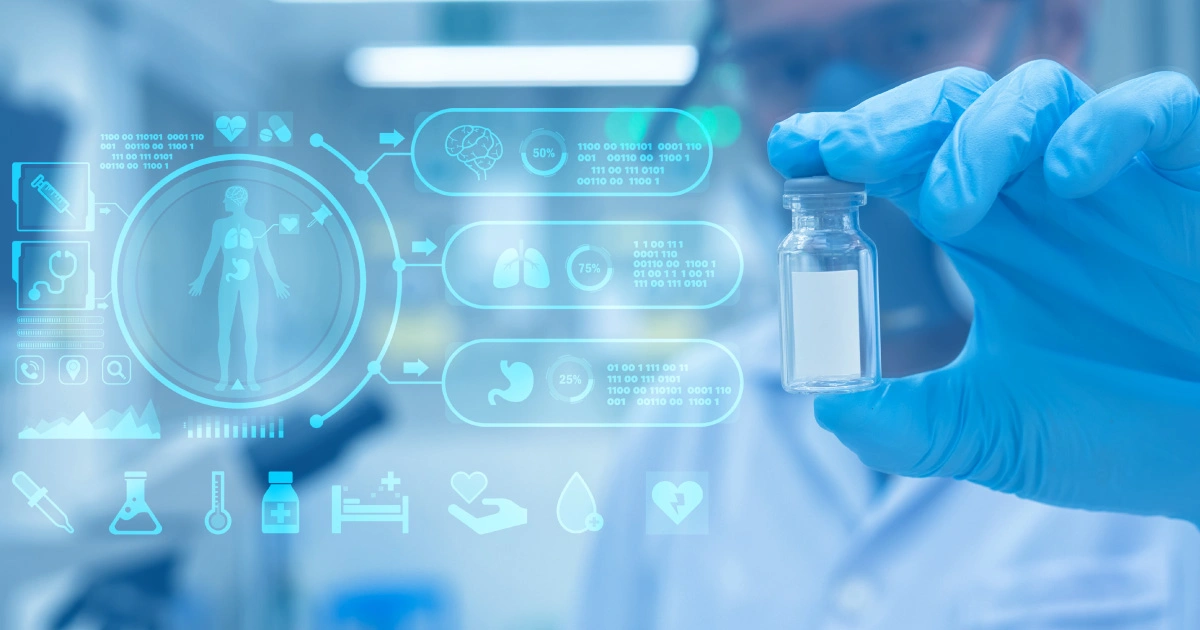
How digital transformation in life sciences delivers a holistic view of your business and tangible ROI
Digital transformation is now a pivotal lever for growth and innovation in the life sciences industry. Various influences – from pricing pressures to more stringent compliance and operational siloes are changing the landscape, especially for pharma and MedTech. As the manufacturer, these changes force you to explore more efficient ways to improve your bottom line. Digital transformation has already brought about monumental changes shaping how you operate and deliver value to your customers. Preparing for an AI-dominated landscape is the next step to sustained growth and profitability.
If you haven’t already implemented a single source of truth end-to-end solution for revenue management and all your business operations, it’s time to open that dialogue. Your competitors are already doing that well beyond the C-suite, with strategizing must-haves and wish lists permeating every team. If you have onboarded an automated revenue management solution, now is not the time to rest assured you are prepared for sustainable growth. You will need to strategize on what is next for your digital business model and whether your current solution can help with efficiency and streamlining processes to be more strategic and less tactical.
Drivers of life sciences digital transformation
With artificial intelligence (AI), machine learning (ML) and the Internet of Things (IoT) coming to the forefront, life sciences are reimagining product development and enhancements, patient engagement and supply chain integrity. The accelerated analysis of vast datasets, improved decision-making and enhanced traceability are just a few of the possibilities unfolding.
The challenges of freeing up your resources to focus on more strategic business components may seem daunting. There’s one clear direction to start with, and that’s looking at new technologies as a way of positively affecting your revenue and increasing operational efficiency. Still, you want to consider those technologies that will best justify costs and demonstrate success to stakeholders. Let’s discuss 3 complex considerations that will positively impact revenue.
- Optimized pricing and emerging models
Life sciences manufacturers, particularly in biopharma and MedTech, face downstream pressures in pricing due to competition, stringent regulatory changes and cost containment strategies. These pricing pressures will ultimately impact your profit margins. By embracing digital transformation, you can effectively address your most pressing challenges and impact your business processes and profitability. For pharma and MedTech, partners and governments are demanding lower-cost drugs and devices and value- and outcome-based pricing models. These evolving pricing models often involve contracts. Your revenue management solution will need the flexibility to handle all the complexities of these models and contracts. You must remain vigilant and agile without compromising on operational excellence. - Stringent regulations
In addition to pricing pressures, pharma and MedTech manufacturers face increasing challenges due to regulatory legislation affecting product costs and operating costs, especially in mature markets. For pharma, there are concerns about the implications of IRA on revenue management and the need to manage the complex factors involved in remaining compliant. You need a flexible, rules-based solution that can help alleviate risk factors. Another concern is the European Union Medical Devices Regulation (MDR), which enforces a more thorough assessment of product safety and performance that drives significant compliance complexities operationally.
Compliance and regulatory adherence remain non-negotiable in life sciences, thus influencing how digital transformation initiatives are shaped and deployed. Privacy concerns, data security and regulatory frameworks continue to dictate the pace and nature of new technology integration. - Shifting from mergers and acquisitions (M&A) to collaboration
Undoubtedly, M&A activity and the operational issues that come with it will continue to be common in life sciences. Today, we see more push to move away from this to collaboration and partnership agreements. With this comes the complexities of transacting and monetizing in a collaboration. Rights and royalties require quick initiative and complex components. Your solution must allow you to see the big picture with complete visibility to minimize risk and maximize profits. You must integrate business processes across complex contracts, rights inventory management, rights usage, and royalty calculations. You must also leverage data management capabilities for fast computations within a single source of truth solution to eliminate siloed operations.
The overall expectation is clear
What is the return on investment? When will we see it?
These are the 2 most pressing questions posed by stakeholders in life sciences regarding digital transformation. With efficiency, satisfaction, cost savings, and revenue in focus, the bar is set high for you to deliver tangible results promptly. You can answer these questions successfully by focusing on these 3 areas: pricing, compliance and partnerships.
Acting proactively and leveraging flexible, rules-based solutions that integrate forecasting, analytics, real-time scenario modeling, AI and machine learning capabilities will successfully answer these 2 crucial questions. The solution should make you more efficient, patient/partner-centric and operationally streamlined while freeing up valuable resources to focus on strategic initiatives.
For more insights on navigating the future of digital transformation in life sciences, watch our webinar hosted by Daniel Newman, driving an interactive conversation with Mandar Paralkar, Global VP, Life Sciences & Healthcare at SAP and myself.
Digital Transformation in Life Sciences with SAP and Vistex - The Futurum Group
Get the latest news, updates, and exclusive insights from Vistex delivered straight to your inbox. Don’t miss out—opt in now and be the first to know!


